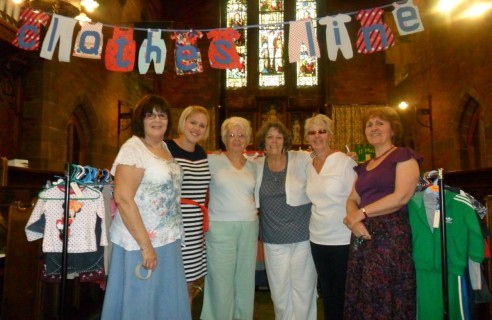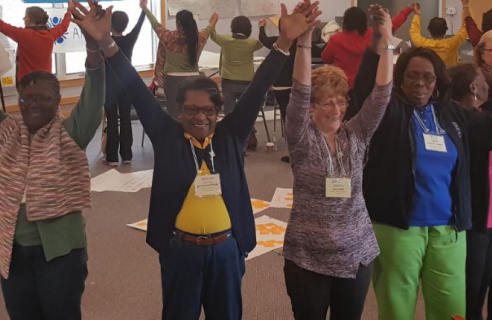You are here

Dementia Action Week 2022
This Dementia Action Week (16th-22nd May), we want to shed light on Mothers' Union's consistent and extensive efforts to support patients with Dementia.
A fidget blanket is a knitted blanket with items attached so that someone in the later stages of dementia can keep their hands busy. People with dementia can often have restless hands, caused by feelings of anxiety or just through boredom, when they can fidget and pick at their clothes. So having a fidget blanket provides comfort as well as simple activities to keep their hands busy.
Fidget blankets – or activity muffs as they are sometimes called - are simple to make with the oddments of yarn that knitters are always keen to use up. The blankets are knitted in stocking stitch, so even a novice knitter can make them, using different colours and textures of wool. Bright colours are always popular with those who receive them. Once the blanket is knitted, a range of items are attached. These can include textured ribbon, beads or small pom-poms to finger, buttons to undo, strips of hook-and-loop fasteners such as Velcro or zips to open and close. Some have a small pocket attached for a small toy, or a handkerchief. It’s good to make some blankets with more ‘male-orientated’ items such as chunky or leather buttons, washers and nuts as these may be more familiar to them. Bits and bobs are included on the inside as well, so that hands can stay warm, while being active. Most blankets have six decorations on the outside and four on the inside – all securely attached so they can’t be pulled off and become a choking hazard. Neither should they have sharp edges or be brittle and liable to break. Fidget blankets are not only appreciated by those with dementia – the blankets are a comforting, attractive and intriguing gift that keeps hands warm and are great for keeping stiffening fingers moving.
Making blankets can be a collaborative activity – even if you aren’t a knitter, you can help by finding large buttons and beads, ribbons and other squishy things for others to attach to the blankets.
In Newcastle, a Mothers’ Union member visits seven residential homes every Christmas, particularly those specialising in dementia care. Margaret dresses as a Victorian lady, bearing all sorts of gifts. She gives the blankets to individual patients who are pointed out to her. The residents feel that they are receiving a gift from royalty and sometimes curtesy! The blanket becomes their property, which is really important. Barbara Packer, former diocesan president in Newcastle, believes that offering practical items like the blankets is a good way to make first contact with care homes. The relationship that can continue, asking what is really needed that Mothers’ Union can help with.
While some dioceses knit fidget blankets for care homes, in others these are made for dementia units at local hospitals - some units actively request these to be made as commercially available blankets can cost over £30.
It’s not just fidget blankets. Activity blankets or aprons (sometimes known as fiddle pinnies) are used for the same purpose, but sewn rather than knitted.
The impact of these simple items is immense. An activity apron was made for Peter*,the husband of a Mothers’ Union member. He had been diagnosed with dementia and become distressed and restless, not speaking for some months. Peter found comfort in fiddling with the bits and bobs, to the extent that he started to speak and was able to thank the member who had made the apron for him.
Encouraging others to get involved in projects like this can spread the message of the work of Mothers’ Union – and in Leeds diocese this spread to Serbia! Tanya, a young mum from Serbia, was invited to a toddler group, run by Judith, a Mothers’ Union member who also made fidget items for a local hospital. Judith encouraged Tanya to help her making the fidget blankets, aprons and blankets. When Tanya’s sister, Vesna, visited England, she learned how to make them as well. After her holiday, Vesna kept herself busy making fidget aprons back in Serbia – and on her next visit to England arrived with a suitcase full of aprons. All three of them have continued sewing and knitting and were able to take six bags to the dementia ward at Pinderfields Hospital containing 23 knitted blankets, 60 aprons and 12 fidget blankets.
As with any other knitting or craft ministry, it’s important to make sure that the items you make are needed before starting to make them. Your diocese may know of care homes or hospital units who would appreciate these items or you could make contact with homes and hospitals in your local area.
*Names changed to protect identity.
*First printed in Families First 2019


